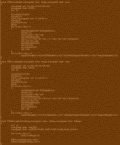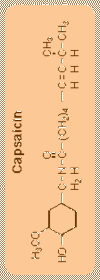newer log

So could all Perl programmers in the world take a moment to change all lines of code that say:
foo && bar;
to instead say
bar if foo;
so I will have to stop and think less often? Thank you very much!
Some of the signs have begun to tatter off of the trees, but a few remain. I drove a little slower this morning, and I think what they actually say is "9AND9NAY" (it's a stencilly font in which the 9's look rather like S's). Which quite nicely fails to signify! (Remember that old thread about signs that don't signify?)

An alert reader writes:
Sorry, your capsaicin structure is off. The ring should be a benzene ring (alternating single and double bonds) rather than a cyclohexane ring (all single bonds), as shown. Also the double bond drawn is ambiguous as to its stereochemistry, when it should be a trans bond. For a definitive answer go to ChemFinder and search for capsaicin.
Reading my old (first edition, I think) copy of the Comer book on TCP/IP, and noting some interesting historical effects. In 1987 or so, Comer could write with a straight face:
Increases in load imply increases in the number of individual users. A problem arises because it becomes difficult to locate information about a given individual. When the Internet began, the Network Information Center published a directory of all users along with their postal and electronic mail addresses. With a user population growing rapidly, printed directories are hopelessly inadequate. The central question has become:How can we automate mechanisms for storing and locating information about individual users?
whereas of course today it strikes us that the more important question is how to avoid having mechanisms for storing and locating information about us.
On the other hand, that old Comer also wrote:
How can we automate mechanisms for storing and locating information about services offered by hosts on the Internet?Researchers are examining automated ways to allow hosts to advertise services and to locate services on other hosts.
Which is still very much an open problem, with only a few sketchy gestures toward a solution.
And just for grins, I note that Comer also said:
The principals have agreed that, as soon as possible, the Internet will migrate from its current TCP/IP protocols to equivalent protocols being defined by the International Standards Organization (ISO).
which is why we're all currently using x.25 networks to talk to each other. *8)
From Rebecca Blood, Dutch Parliament OKs Unprecedented Gay Marriage Rights:
Lawmakers thumped their desks in approval when the vote passed 109-33, and some of the scores of witnesses in the packed public gallery applauded and embraced.
Now why don't we have lawmakers like that around here? Howcum the U.S. ended up with such a big fraction of the West's intolerant religious whackos?
From Medley, a page with links to online version of various Hugo-nominated stories. (That's the Science Fiction Achievement Awards, for you non-fen.)
Boy, is this office a mess! If you don't hear from me for a few days, please call security and advise them that I've probably become trapped under a pile of paper, and they should get out the Jaws of Life...
Gretchen Lieberum also replied, to the fanmail that I sent her just yesterday saying how much I was enjoying three a.m., which I ordered from Amazon the other day after stumbling across a few tracks on MP3.com's Acid Jazz channel. It's rich and lovely stuff. Apparently self-produced, too; the only remotely commercial information in the CD case is an AOL email address...
A reader writes that paradise is a kind of
illusion.
And someone who may very well be bovine writes that it is
A type of organic clockwork that is hooked up via electrodes to a giant fish, which is larger than the sun. When the fish speaks, electro-organic energy shoots down the electrodes into the mechanism of gears which make up the underside of the divine clock, this causes the gears in the clock to be set in motion, which in turn is responsible for the movement of the spheres and of the muscles in our jaws, giving each and every one of us a direct connection to the divine wisdom fish.
which in turn reminds me of the Banach-Tarski paradox, which is a proof that you can dissect a ball the size of a pea into a finite number of (rigid) pieces, and then reassemble those pieces to form a ball the size of the sun. Or a fish.
And:
The Bicycle Pedaling Frog, by taking up origami, teaches us to never take marmalade for granted.
But enough astronomy.

It occurs to me that I haven't yet linked to any CSS descrambling code; so now I have. (I also just ordered the T-shirt.) Which isn't to say that I think outlawing the creation or distribution of a piece of source code is inherently impossible or undesirable. If someone were to encode, say, a few thousand credit card numbers (along with names and addresses and expiration dates) into some C source, I think it'd be good to keep people from distributing that, even if set to music. (Gallery link from Michael Travers.)
From Roger D. Hodge, comparing apples and oranges:
Figure 2 shows a comparison of the 4000-400 cm-1 (2.5-25 mm) infrared transmission spectra of a Granny Smith apple and a Sunkist Navel orange.
So here's my amazing e-commerce story of the day. Years ago, before M and I were married, when she was still in college, I went to visit her in an apartment she and her sister were subrenting (or something like that; she should really tell this part, as she has a memory). The apartment had a number of bookshelves, and some of these shelves contained books left there by whoever owned the apartment (or the primary lease, or whatever). I browsed through some of those books in idle moments (ah, I remember idle moments; idle moments were great!) and one in particular appealed to me so much that I memorized the info (having no paper at hand, I guess): it was Bill Beatty's "Along the Great Divide", published by Cassell in Australia (a collection of stories, some amusing, about Australia and Australians). I composed for myself a little brain-song to remember it, and it stuck all too well (along the same lines, I still remember that what I was going out to buy some Thanksgiving decades ago was "Yams, eggs, juice, and milk"). Well today that little Bill Beatty ditty spun by in my head, as it does, and it occurred to me to look for those books on the web. Turns out that they're out of print, but a bookstore in Australia has a copy (not of "Along the Great Divide", but of another Bill Beatty book that I think was on that same shelf) for a modest fee (shipping included). So I expect it any month now!
Isn't nature wonderful?
Vernor Vinge replied to the mail I sent him back in June. You coulda knocked me over with a feather! He said "I want to have a novel turned in to my publisher by mid-2001". Also, in reply to my
I would vote for a novel set at the far edge of the High Beyond, dealing with odd mind-stretching things that come in from the Transcend, with how more-or-less ordinary human-flavor minds deal with these very odd things, and so on. Opportunities for both wild tech and reasonably deep thinking about humanity and purpose and stuff. Of course, this is probably what all us geeks are begging you for! *8)
he said
True, I see this novel as kind of the capstone on the whole thing. I'd want to do a really strong job, at about the length of the FIRE and DEEPNESS. I think it would be harder than either of them. I want my next novel to be shorter, so this one is not next on my list.
Hey, whatever he wants to do next is OK with me!
On the Winamp: JazzRadio Berlin (American Jazz, German announcers).
Today's Blind Link: A shot from some strange alternative future.
From gorjuss: Life in the Real-Time City: Mobile Telephones and Urban Metabolism:
the widespread use of these devices is quickening of the pace of urban life and at an aggregate level, resulting in a dramatic increase in the metabolism of urban systems.
I like that: "the metabolism of urban systems".
Geegaw continues to be indescribable but irresistable; I'm a great fan of not-Weblogs in general, and of Geegaw's latest incarnation in particular. (Related: Parents Strongly Cautioned is back, and Come to My Senses is rolling along.)
From Ben Hyde, an interesting-looking (i.e. I've skimmed it, but haven't had the time to read in detail) paper on the origin and future of "common carriage":
For centuries, common carriage principles have played an important role in the infrastructure services of transportation and communications. They intended to guarantee that no customer seeking service upon reasonable demand, willing and able to pay the established price, however set, would be denied lawful use of the service or would otherwise be discriminated against. For one hundred years these principles, despite their often confused application and interpretation, have aided telecommunications users' access, and thereby also stimulated the development of networks.
Know Your Customer: It's back! (From TBTF.) "Know Your Customer" was an attempt by the U. S. government to get banks to gather all sorts of information on their customers. It was shot down by Massive Public Outcry, but now they're trying again.

Today's random smart person: Tom Erickson.
Random interesting blog: FutureLog.
Random molecule: capsaicin (it makes hot peppers hot; you can also rub it on your skin. If you want to.)
A number of Nomic moves are queued up, but I'm not quite sufficiently jazzed today. What a lazy Scribe...
On the way to work this morning, driving down the parkway, I saw stapled to trees and telephone poles these signs, red letters on white, saying something like "SANDGNAT" or maybe "SANDSWAY". They looked stenciled; at least a couple of them were backwards. They went by too fast to get a really good look at. There seemed to be at least a dozen of them, at variable intervals. I have no idea what they were about. I love stuff like that.
From Jonathan Prince, IOC Bans Athletes From Net Storytelling:
The ban is stated in Rule 59 of the Olympic Code of Conduct, an International Olympic Committee document that all athletes must sign before competing in the Games. Rule 59 states that an Olympic athlete is not permitted to record his thoughts of his Olympic experience and have it posted on the Internet.
So no Olympian bloggers! I have the general impression that the IOC are a bunch of jerks and stuffed-shirts in general, unfortunately. (Not What You Might Expect: IOC.org.)
Parasites would like to control the minds of their hosts, and there's really no reason they shouldn't sometimes succeed. Recent evidence suggests that Toxoplasma gondii, a surprisingly widespread parasite, does in fact alter the behavior of rats that it infects, making them more likely to be eaten by cats (which the parasite requires for the next phase of its life cycle). This results in one fun quote from the August 12th Science News (not online AFAICT):
low grade infections may result in more subtle effects, such as odd behavior and IQ dips. They estimate that the parasite infects 22% of UK residents and 88% of the French.
as well as more significant and profound thoughts about the extent to which our behavior may be shaped by ends of which we are ignorant, and which aren't necessarily "higher" than our own. (Here is a brief online story on the Toxoplasma studies: Suicidal rats hint at mindbending parasite.)

Of course we expect meme complexes to alter the behavior of the infected in various ways (people hum songs, spread religions), but protozoans? Eeeeewww!
(See Dawkins, The Extended Phenotype.)
RISKS: I dunno if anyone reading this doesn't already know all about Risks (formally "Forum on Risks to the Public in Computers and Related Systems", on Usenet as comp.risks), but everybody should. The regular digests are good reading, and I've just discovered the Illustrative Risks page, which is worry in concentrated and summarized form.
Four random interesting pointers culled from a recent RISKS:
- the Emulex stock hoax (a fake press release sends a real stock tumbling),
- a cellphone prank in Japan (many phones with more function than security were made to dial a number when they visited a web page; please ignore the sentence about viruses getting into phones via SMS!),
- a report on the security (or lack thereof) in SSL servers as they are actually deployed,
- the GAO report on the (in)security of the EPA's computers.
A kind reader points out that yesterday's badger isn't a link. That's true! It isn't. Maybe someday I'll write about the badger.
Anti-virus people get calls on this one all the time. See if you can guess what causes it before you follow the link! *8) Computer Randomly Plays Classical Music
During normal operation or in Safe mode, your computer may play "Fur Elise" or "It's a Small, Small World" seemingly at random.
Thanks to Microsoft for writing it up when it isn't even their fault. Dunno why it never occurred to me to write something for antivirus online.
New Notes and Recommendations from Phil Agre. He's concerned that the U.S. is going insane in a particular way. Good reading as always.
One quote and link from that Agre piece: "Even the Center for Media and Public Affairs, which can find liberal bias in a bowl of Cheerios, has found extreme media bias against Gore."
Yet another Web catalog: OpenHere.com. I have no reason to think that it's any better than any other; I noticed it only because they have a small page of Nomics, which includes ours.
Reform Party news: Buchanan seems to have the best shot at the money, but the other feller is still in the game, and it's all headed for the courts. Now that was a real convention! *8)
Writing about reading: Ray Hotsy-Totsy Davis's Things Are Tough All Over, a brief essay about genres and mainstreamness and Great Books and other stuff. I'd like to write this intelligently about stuff I read.

Ego strokes: responses to the (repaired) anniversary poll have been most gratifying. Please do add your voice if you feel like it, and even if you have something critical to say!
My ego is also gratified by a recent article in American Way Magazine (one of those paragons of critical journalism found in the backs of airplane seats; AFAICT, the article isn't online). I'd been told about it, but recently our faithful Communications person actually found a few copies. It's about us anti-virus types (although the pictures seem to be from their standard photo collection, and aren't anyone I know), and after talking to Steve for awhile it says
White's bespectacled counterpart, David Chess, sports an open flannel shirt, white T-shirt, and khaki pants. Sandals are parked on the floor near his desk, which is piled with papers and empty soda cans. As he works at his terminal, his bare feet keep beat to a tune playing in his head. When he stops to speak, words erupt in long spurts, like hot lava.
Spurt, spurt! *8)
top
earlier entries